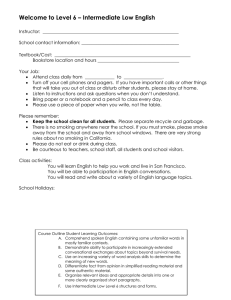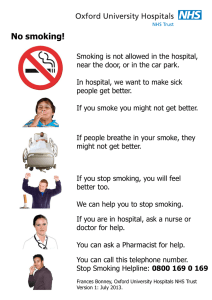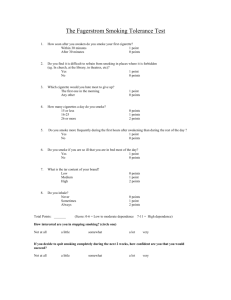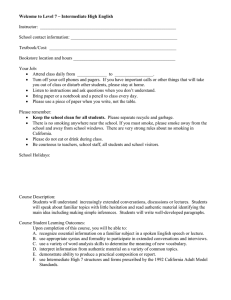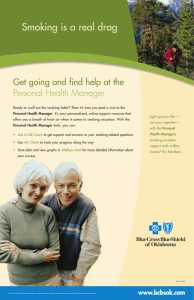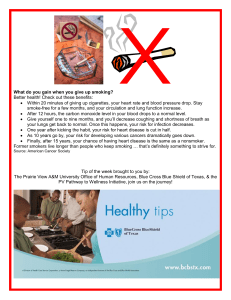3A- Coping With Triggers
advertisement
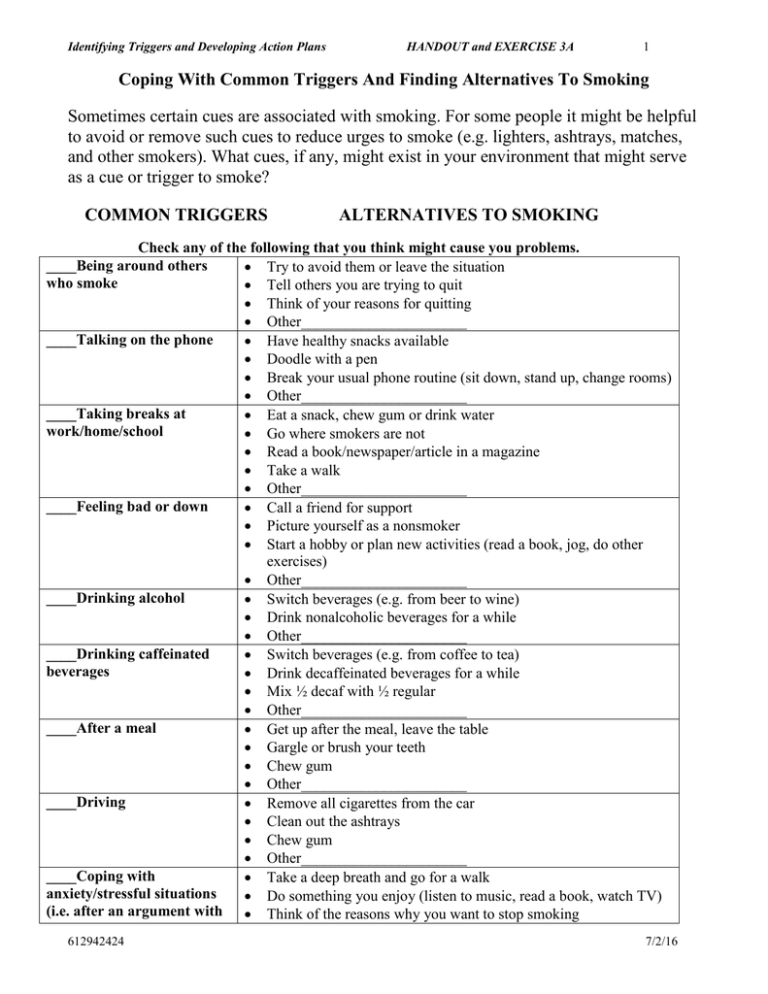
Identifying Triggers and Developing Action Plans HANDOUT and EXERCISE 3A 1 Coping With Common Triggers And Finding Alternatives To Smoking Sometimes certain cues are associated with smoking. For some people it might be helpful to avoid or remove such cues to reduce urges to smoke (e.g. lighters, ashtrays, matches, and other smokers). What cues, if any, might exist in your environment that might serve as a cue or trigger to smoke? COMMON TRIGGERS ALTERNATIVES TO SMOKING Check any of the following that you think might cause you problems. ____Being around others Try to avoid them or leave the situation who smoke Tell others you are trying to quit Think of your reasons for quitting Other______________________ ____Talking on the phone Have healthy snacks available Doodle with a pen Break your usual phone routine (sit down, stand up, change rooms) Other______________________ ____Taking breaks at Eat a snack, chew gum or drink water work/home/school Go where smokers are not Read a book/newspaper/article in a magazine Take a walk Other______________________ ____Feeling bad or down Call a friend for support Picture yourself as a nonsmoker Start a hobby or plan new activities (read a book, jog, do other exercises) Other______________________ ____Drinking alcohol Switch beverages (e.g. from beer to wine) Drink nonalcoholic beverages for a while Other______________________ ____Drinking caffeinated Switch beverages (e.g. from coffee to tea) beverages Drink decaffeinated beverages for a while Mix ½ decaf with ½ regular Other______________________ ____After a meal Get up after the meal, leave the table Gargle or brush your teeth Chew gum Other______________________ ____Driving Remove all cigarettes from the car Clean out the ashtrays Chew gum Other______________________ ____Coping with Take a deep breath and go for a walk anxiety/stressful situations Do something you enjoy (listen to music, read a book, watch TV) (i.e. after an argument with Think of the reasons why you want to stop smoking 612942424 7/2/16 Identifying Triggers spouse/co-workers) HANDOUT and EXERCISE 3A 2 Other______________________ DEALING WITH URGES TO SMOKE THINGS YOU MIGHT CONSIDER: Delay: When the urge strikes, tell yourself that you will wait 10-15 minutes. By not satisfying the urge immediately, you begin to interfere with the routine of smoking and increase the probability that you will experience a reduction in the intensity of the urge. Behavior Substitution: This strategy is often used with the “delay” technique. It is the replacement of one behavior, smoking, with another behavior. For example, when you have the urge to smoke, you might decide to have a piece of gum, take a walk, draw or doodle, knit, play a game, brush your teeth, or any number of other things that would work for you. Rewarding yourself: This is an important strategy. Reward yourself when you have been successful at not smoking for a certain period of time. For example, go to a movie after not smoking for two weeks; buy yourself a CD or video after not smoking for one month, etc. Escape: When you are in a situation where you are tempted to smoke, leave, rather than smoke. Seek Support From Others: Talk to someone who will be understanding of your situation and will give you encouragement. Rearrange Your Environment: Put your ashtrays away, do not have cigarettes around, put reasons for quitting in key places, stock up on gum, nuts, fruit and vegetables to snack on, visit dentist and have your teeth cleaned, clean your house and car thoroughly. Rearrange Your Activities: Cut back on drinks associated with smoking, at least temporarily; put yourself into “no smoking” situations and places, try out new activities and places. STOP AND THINK ABOUT Think about the positive benefits of not smoking. Think about the negative effects of smoking. Distract yourself by thinking about other things, especially positive things that hold your attention. Imagine yourself as a nonsmoker. Recognize that while quitting may seem difficult, many people have done it, so it is very do-able. Imagine your friends’ or family’s positive reactions as you stop smoking . 612942424 Identifying Triggers HANDOUT and EXERCISE 3A 3 WHAT COULD TRIGGER A RETURN TO SMOKING? What types of situations have been associated with your smoking that might put you at risk of a relapse? (check all that apply) ___ Missed the feeling ___ Missed holding something / having my hands busy ___ Social gatherings (parties, sporting events) ___ Relaxing at home ___ After dinner ___ When I’m happy or celebrating ___ Upon waking ___ During work/office/school breaks ___ See others smoking ___ Drinking coffee or tea ___ Boredom ___ Depressed ___ Work pressure or other stresses (frustration, anger) ___ Withdrawal symptoms from quitting ___ Weight gain ___ Other ________________________________________________________ ___ Other ________________________________________________________ PLAN AHEAD FOR HOW TO DEAL WITH TRIGGERS For example, if you know that being around others who smoke has been a trigger for going back to smoking in the past, you could plan to sit in the non-smoking section at restaurants, ask relatives and friends who smoke not to smoke around you, and so on. For the trigger situations you listed above, list on the next page how you plan to deal with those situations other than smoking. 612942424 Identifying Triggers and Developing Action Plans HANDOUT and EXERCISE 3A 4 WHAT ARE YOUR FOUR HIGHEST RISK SITUATIONS FOR SMOKING? Trigger Situation #1 ___________________________________________________________________________________ My plan for dealing with this situation is: ___________________________________________________________________________________ ____________________________________________________________________________________ ____________________________________________________________________________________ _________________________________________________________________________________ Trigger Situation #2 ___________________________________________________________________________________ My plan for dealing with this situation is: ___________________________________________________________________________________ ____________________________________________________________________________________ ____________________________________________________________________________________ _________________________________________________________________________________ Trigger Situation #3 ___________________________________________________________________________________ My plan for dealing with this situation is: ___________________________________________________________________________________ ____________________________________________________________________________________ ____________________________________________________________________________________ _________________________________________________________________________________ Trigger Situation #4 ___________________________________________________________________________________ My plan for dealing with this situation is: ___________________________________________________________________________________ ____________________________________________________________________________________ ____________________________________________________________________________________ _________________________________________________________________________________ 612942424 7/2/16
